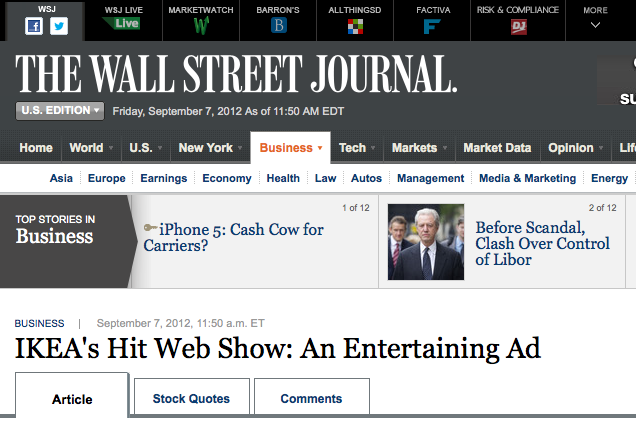
By BEECHER TUTTLE
Branded entertainment has entered a new era.
“Easy to Assemble,” a tongue-and-cheek comedy series co-produced by its creator and lead actress, Illeana Douglas, and the Swedish furniture retailer IKEA, illustrates the latest twist.
The series, which achieved near cult status in its first three seasons, follows the trials and tribulations of Ms. Douglas, who has left a life of Hollywood glitz for a job at the big-box furniture store in Burbank, Calif.
Available only on the Web, the show, which features cameos by the likes of Jeff Goldblum, Tom Arnold and Jane Lynch, isn’t broken up with ads. Instead, the entertainment is the ad, albeit a well-disguised one. The IKEA store is the show’s set, and the company’s end goal is to create buzz, name recognition and a fun image for the brand.
Companies have sponsored entertainment for decades. Indeed, Procter & Gamble Co. backed a series of radio soap operas in the 1930s. But corporate production of shows distributed via the Web is giving marketers new power, enabling them to break free from traditional print, TV and digital advertising that consumers can easily bypass.
“We recognized that consumers were just skipping [TV] commercials,” says Richard DelCore, a former director of global brand entertainment at P&G who retired earlier this year. As a result, branded entertainment budgets have “absolutely increased,” Mr. DelCore says. He estimates that P&G is now spending up to 5% of its marketing budget on the effort. (The company declined to comment.)
Branded entertainment also makes measuring product awareness much easier. Companies can check the number of page views, Facebook “likes” and “shares” on social media, along with responses to surveys and contests. “Market-research methodologies are now sophisticated enough to very clearly correlate branding with sales,” Mr. DelCore says.
Ford Motor Co. has put about 10% of its budget for a new-car launch into branded entertainment, using social media and the Web to tell “the stories we want to tell,” says Crystal Worthem, the manager of brand content and alliances at Ford.
The car maker recently introduced “Random Acts of Fusion,” a Web show that follows “American Idol's” Ryan Seacrest and “Community's” Joel McHale as they take the 2013 Ford Fusion to America, hosting video contests and free food festivals to encourage ordinary folks to interact with the car. After the campaign’s launch, traffic to the new model’s Web page rose 20%, Ms. Worthem says.
The success of “Easy to Assemble,” which social-media users have already shared more than 1.5 million times, has led IKEA to roughly triple its efforts to create branded content. It’s dedicating between 2% and 3% of its global marketing budget to branded entertainment, says Alia Kemet, IKEA’s U.S. media manager.
“Fix This Kitchen,” a 30-minute A&E show sponsored by IKEA and starring designer Nicole Facciuto and celebrity chef Eric Greenspan, surprises household cooks by remodeling their outdated kitchens with products from the furniture store. According to a third-party analysis by Latitude Research, nearly 80% of the show’s viewers are more likely to visit, recommend or purchase an IKEA product within six months of watching the show.
IKEA attributes much of its success in branded entertainment to handing over the reins to Hollywood talent like Ms. Douglas, a veteran of nearly four dozen films, and to asking only that the furniture chain’s core values—including being fun, sophisticated and cheerful—be represented. “Our content resonates because it’s produced by entertainers, not salespeople,” Ms. Kemet says.
“Easy to Assemble” evolved from a pilot Ms. Douglas pitched to TV networks called “Supermarket of the Stars.” The pilot, based in a local food store, had the same basic premise as the IKEA show, so when it didn’t sell, she pitched the show to IKEA.
“The first season was wildly experimental,” says Ms. Douglas, who credits IKEA with a hands-off approach. “The only note they gave me the whole first season is that they sell frozen yogurt, not ice cream.”
Recognizing the shift in corporate marketing budgets, some outside production houses have begun creating Web videos on spec. Online video company Blip opened its own branded entertainment studio in June. It often writes pilot episodes, creates show posters and picks talent before ever speaking to a sponsor, says Evan Gotlib, senior vice president of advertising sales and branded entertainment. It has worked with Arby’s, Capital One, Reebok and Samsung.
Blip hosts original content on its own site but also disseminates video through Facebook, Twitter, Yahoo, AOL and a network of independent blogs, Mr. Gotlib says. Producing professional, Web-based branded content with a company like Blip can cost anywhere from $250,000 to $800,000, he adds.
“Stars who may not have been open to the process a few years ago are coming on board,” says Mike Wiese, the director of branded entertainment at ad agency J. Walter Thompson New York.
The lower entry point for branded entertainment has opened the door to smaller companies with less robust advertising budgets. And branded entertainment isn’t just for companies targeting consumers; businesses looking for alternative ways to reach new clients are also climbing on board.
Web-security-solutions provider SonicWall recently built a videogame that challenges corporate-technology decision makers to operate a scanner that acts like the company's network security product. More than one million users tried the game, resulting in over 1,000 qualified leads, says Rick Wooten, former director of eBusiness and eMarketing at SonicWALL.
Of course, even a small show can flop. Most successful branded marketing campaigns share three things: star quality, cross-platform promotion and a core audience of highly engaged people who will act as evangelists, says Rick Mathieson, founder of the creative strategy firm Mathieson and author of “The On-Demand Brand.”
“I’d love to say we sat in a room and strategized [about getting millions of hits], but that is not how it happened,” Ms. Kemet says of the “Easy to Assemble” campaign. “You don’t know what’s going to go viral until it hits the market.”